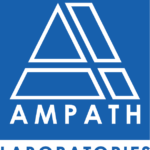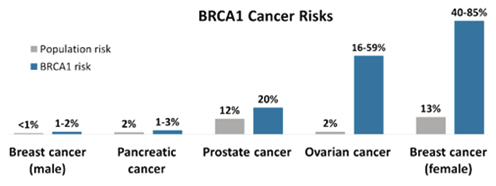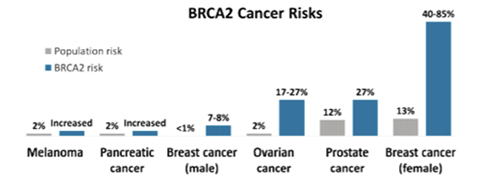Hereditary and Familial Cancer
HEREDITARY BREAST OVARIAN CANCER SYNDROME (HBOC) INTRODUCTION:
Worldwide, 1 in 8 women (13%) will be diagnosed with breast cancer.
The majority of these women will not have any family history of breast cancer.
Only 5-10% of all breast cancers can be attributed to a hereditary cause– usually a germline pathogenic variant (mutation) in one of the cancer susceptibility genes (that may be inherited from one of the parents). A person with a mutation in one of these genes has a higher risk than the general population of developing breast, ovarian and/or other cancers.
Types of Cancer
No Data Found
If an individual has a parent with a BRCA mutation, or a mutation in one of the other cancer susceptibility genes, he or she has a 50% chance of inheriting the same mutation. Both males and females have an equal chance of inheriting a BRCA mutation. This is called autosomal dominant inheritance.
Inherited cancers are more likely to be found in families where multiple relatives have the same or related cancers, these cancers are found in multiple generations and occur in close relatives on the same side of the family. People with a faulty (mutated) cancer-predisposition gene are more likely to develop cancer at younger ages and may have more than one cancer diagnosed during their lifetime. Rare cancers may also occur in a family (such as breast cancer in men), and therefore family members may be at an increased risk for cancer.
Familial cancers are those that appear to have a genetic component, affecting more family members than would be expected by chance alone. However, a single genetic cause or explanation is not known. Familial cancers may not be linked to a known gene mutation but may be due to a combination of factors shared by a family, including genetic and environmental factors.
WHEN SHOULD I SUSPECT MY CANCER IS INHERITED?
- Individuals who have any blood relative with a known mutation (pathogenic or likely pathogenic variant) in a cancer susceptibility gene
- Women diagnosed with breast cancer at 45 years or younger
- Women diagnosed at age 46 – 50 years with:
- Unknown or limited family history
- A second primary breast cancer o At least one close relative with breast cancer at any age
- One or more close relative with breast, ovarian, pancreatic, or prostate cancer at any age
- Women diagnosed at age 60 years or younger with triple negative breast cancer
- Women diagnosed at any age with:
- At least one close relative with breast cancer diagnosed younger than 50 years
- At least two close relatives on the same side of the family with breast cancer at any age
- At least one close relative with ovarian cancer at any age
- At least two close relatives on the same side of the family with pancreatic and/or prostate cancer at any age
- At least one close male blood relative with breast cancer
- Ashkenazi Jewish or Afrikaner or other ethnic groups associated with founder mutations
- Women with a personal history of ovarian cancer (including cancer of the fallopian tube or peritoneal cancer)
- A mutation identified in testing of tumour tissue that has clinical implications if it is also identified in the germline
Reference: NCCN Clinical Practice Guidelines in Oncology (NCCN Guidelines) Genetic/Familial High Risk Assessment: Breast, Ovarian and Pancreatic. Version2.2021
WHAT DO I DO IF I HAVE A FAMILY HISTORY OF CANCERS AND WANT TO GET TESTED?
- Make an appointment with a genetic counsellor who will review your medical and family history and determine whether you meet the criteria for a specific hereditary cancer syndrome. To prepare for the meeting find out as much as possible about your family’s cancer history – age of diagnosis and type of cancer.
- The genetic counsellor will explain the risks and benefits of genetic testing, the importance of these results for yourself and other family members, and answer all your questions.
- Taking the history into account, the counsellor will discuss possible cancer risks, genetic testing in general, and medical management that may be available if a specific mutation is identified in a cancer susceptibility gene
- The most appropriate genetic test option, taking the family history into account, will be discussed.
- The genetic counsellor will coordinate the collection of a blood sample and will plan to discuss the results and the implications thereof with the patient.
BENEFITS OF DOING GENETIC TESTING
- A positive test result can help a person to understand and make informed decisions about their current and/or future health. Risk reducing options are available to reduce certain cancer risks.
- For someone who is already diagnosed with a cancer, the results of genetic testing may enable the oncologist to make decisions about treatment. Results will also enable further discussions around understanding risks for the development of other cancers.
- Genetic testing provides an opportunity for family members to learn more about their own cancer risks.
- A true negative result gives a person a sense of relief not only regarding their own cancer risk, but also knowing that their children are not at risk of inheriting the family’s cancer susceptibility gene.
WHERE CAN I FIND A GENETIC COUNSELLOR?
The Gauteng-based Ampath Genetics Clinic is situated at 167 Witch Hazel Avenue, Highveld Park, Centurion, and two genetic counsellors are available at this clinic. Another Ampath genetic counsellor is available in Ballito, KZN. All are available for face-to face consultations or online consultations.
For further information and for appointments, please contact us on:
Tel: 012 678 0645
Email: geneticsclinic@ampath.co.za
Request an appointment: https://form.jotform.com/231854034094555

BRCA Gene Mutations: Cancer Risk and Genetic Testing
What are BRCA1 and BRCA2?
BRCA1 (BReast CAncer gene 1) and BRCA2 (BReast CAncer gene 2) are genes that produce proteins that help repair damaged DNA. Everyone has two copies of each of these genes—one copy inherited from each parent. BRCA1 and BRCA2 are sometimes called tumor suppressor genes because when they have certain changes, called harmful (or pathogenic) variants (or mutations), cancer can develop.




